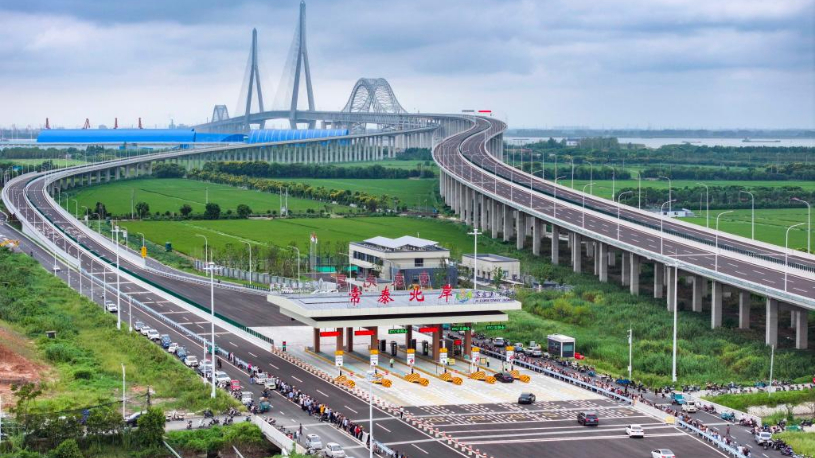Childcare subsidy eases child-raising burden for Chinese families
Source: Xinhua
Editor: huaxia
2025-09-12 16:05:15
SHENYANG, Sept. 12 (Xinhua) -- Han Peng, a resident of northeast China's Liaoning Province, on Wednesday received a text message, telling him that applications for China's childcare subsidy had officially opened.
"I immediately went to the Alipay app and uploaded the relevant documents by following the instructions," said the 35-year-old father. Han revealed that the entire process took about 10 minutes.
China introduced the nationwide childcare subsidy program, effective from Jan. 1, 2025, which is expected to benefit more than 20 million families each year, as part of the country's efforts to support families and encourage childbirth.
A Chinese health spokesperson on Monday announced that the program was open for applications. The program offers families 3,600 yuan (about 505.5 U.S. dollars) per year for each child under the age of three.
Han's daughter was born in January in Liaoning's capital Shenyang. According to calculations, his family is entitled to a total of 10,800 yuan in childcare subsidies.
POLICY WELCOMED
As one of the world's most populous countries, China is facing a dual demographic challenge -- a shrinking number of newborns and a rapidly aging population.
The country's birth rate and total number of newborns had declined for seven consecutive years before experiencing a modest rebound in 2024. Meanwhile, China's population aged 60 and above had reached 310 million by the end of last year.
Liaoning has one of China's highest proportions of elderly residents, while its birth rate is among the lowest.
Wu Pei, an official with the Health Commission of Liaoning Province, told Xinhua that the policy is expected to benefit over 520,000 babies in that province. As of 3 p.m. Wednesday, the health commission had received roughly 485,500 applications.
Nationwide as of 9 a.m. Wednesday, more than 24 million applications have been submitted, accounting for about 80 percent of the target population.
In the populous Henan Province in central China, local cadres took various measures to promote this policy among residents.
Sun Bailu, Party secretary of a community in the Jianxi District of the city of Luoyang, said they shared details of the application process via residents' WeChat groups. They also visited a kindergarten in their jurisdiction to conduct a lecture for parents of toddlers.
"During the online and offline presentations we could see that the policy is welcomed by parents -- many of whom immediately expressed their intention to apply," she said.
The kindergarten monthly childcare charge is 540 yuan, while the government subsidy is 300 yuan a month -- which covers more than half of the kindergarten charge. The total annual amount of the subsidy, which is 3,600 yuan -- is nearly the average monthly salary in Luoyang last year.
"For ordinary families, this gesture is substantial," said Sun.
EASING THE BURDEN
According to Guo Yanhong, deputy head of the National Health Commission, this childcare subsidy marks the first large-scale, universal and direct cash assistance program aimed at enhancing public well-being ever implemented nationwide since the founding of the People's Republic of China.
"This is a smart investment in both children and the economy," said Amakobe Sande, representative of the United Nations Children's Fund (UNICEF) to China.
"The choice of a cash transfer, rather than a tax credit, will support the most vulnerable families," she said. "Making it universally available to children in both urban and rural areas will help address regional gaps in child support, while ringfencing a central budget to cover the costs of this investment will ensure sustainability."
"Distribution of the national childcare subsidy reflects advancement and innovation of the fertility support policy system at the national level," said Song Limin, a researcher with the School of Public Management at Liaoning University.
She noted that this policy plays a positive role in terms of publicity and advocacy for the recovery of fertility levels in China. "It is helpful for enhancing the fertility rate and promoting the possible growth of the birth rate," she said.
China has steadily loosened its family planning policies over the past decade, phasing out the one-child policy by allowing married couples to have two children in 2016 -- and announcing support for married couples wishing to have a third child in 2021.
In addition, starting from the autumn semester of 2025, the country will waive the care and education fees for children in public kindergartens in the preschool year -- with this policy expected to cover 12 million children.
Multiple local governments, including in Shenyang, have piloted programs in recent years to subsidize families with young children.
Han Peng is happy to see their child-raising costs reduced by such policies. "My wife and I have reached consensus that the sum of money we saved will be used for our daughter," he said. "We will take her on trips to broaden her horizons, and have her enrolled in classes to learn sports or musical instruments she might like." ■











Comments